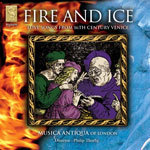
Fire and Ice: Love Songs from 16th Century Venice
 $35.00
Out of Stock
$35.00
Out of Stock6+ weeks add to cart
Fire and Ice: Love Songs from 16th Century Venice
Musica Antiqua, directed by Philip Thorby; with Clare Wilkinson, Mezzo-Soprano
[ Signum / CD ]
Release Date: Thursday 14 August 2003
This item is currently out of stock. It may take 6 or more weeks to obtain from when you place your order as this is a specialist product.
"these performances.... communicate an infectious sense of enjoyment and enthusiasm (and) make thoroughly satisfying listening."
- Daily Telegraph 12 October 2002
Signum Records is pleased to present the first of a series of three discs by Music Antiqua of London, featuring the music of three Italian cities.
In the late 15th century, Italy was divided between the independence of the mighty Venetian Republic and tiny Dukedoms such as Ferrara and Mantua. Music and literature were patronised by the ruling classes as statements of power and local identity. However the most revered European composers were from the north, and their musical style owed little to Italian culture.
In northern Italy an educated classicist, Isabella Marchioness of Mantua, devised the frottola where text was set to a simple melody following speech rhythms, and accompanied by 2 or 3 instruments. The frottola is a Cinderella of Renaissance song and has suffered in comparison with the English and Italian Madrigal and the French Chanson in the 2oth century revival of interest in Renaissance music.
On Fire and Ice we present frottole taken from a Venetian manuscript, compiled around 1520, to argue the case for a re-evaluation of this repertoire. The collection is notable for the quality of both the poetry and the music. The texts deal frequently with emotional extremes - the "fire and ice" of our title!
Modelled on the court bands of the 16th century, Musica Antiqua is the only group in Great Britain to play on specially commissioned matched sets of viols and recorders, copied from 16th century originals. This CD offers a rare opportunity to hear the very different sound these instruments make compared to their "modern" counterparts from the 17th and 18th centuries.
Tracks:
1 Bussa la porta [villotta à 3]: anon [0:28]
2 Su, su, leva [frottola à 4]: Bartolomeo Tromboncino (c.1470-1535) [1:57]
3 Era di maggio [villotta à 3]: anon [0:19]
4 La via de la fiumera [frottola à 4]: anon [1:31]
5 Il marchese o di Saluzio [villotta à 3]: anon [0:18]
6 El marchese di Saluzzo [saltarello à 4]: anon [1:27]
7 Donde ne vienstu bella [villotta à 4]: anon [0:24]
8 La gatta (basse danse à 4): Pierre Attaingnant (c.1494-1551/2) [1:02]
9 Nel tempo che riveste il verde manto [frottola à 4]: Ioannes Lulinus Venetus (fl. early 16th c.) [3:39]
10 Vostro son, né d'altra mai [frottola à 4]: anon [1:58]
11 O vaghe luci [frottola à 4]: anon [4:35]
12 Recercar secondo (lute solo): Vicenzo Capirola (1477 - after 1548) [2:38]
13 O miei ciecha e dura sorte (lute solo): Marco Cara (c.1470 - ?1525) / Capirola [2:15]
14 Che farala (lute solo): Bartolomeo Tromboncino / Capirola [1:15]
15 Amor, da che convien [frottola à 4]: anon [4:10]
16 La morte de la ragion [pavana à 4]: anon [2:01]
17 Dura passion [frottola à 4]: anon [2:19]
18 O dolce farfarela [frottola à 4]: anon [1:02]
19 Mentre io vo per questi boschi [frottola à 4]: Marco Cara [3:37]
20 Pavana alla ferrarese (lute solo): Joan Ambrosio Dalza (fl. 1508) [0:51]
21 Saltarello (lute solo): Joan Ambrosio Dalza [0:53]
22 Piva (lute solo): Joan Ambrosio Dalza [0:49]
23 Tanto mi trovo [frottola à 4]: anon [3:14]
24 Aspicias utinam [frottola à 4]: Bartolomeo Tromboncino [5:48]
25 Perché son tutto foco [frottola à 4]: Marco Cara [3:40]
26 Fiamma amorosa e bella [frottola à 4]: Cara? / Tromboncino? [2:54]
27 Nel foco tremo [frottola à 4]: Bartolomeo Tromboncino [2:39]
